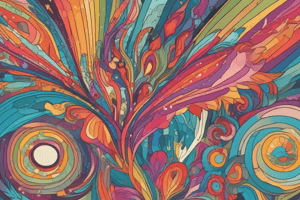Podcast
Questions and Answers
What is the origin of the word 'Art'?
What is the origin of the word 'Art'?
- Ornamentation
- Persian (correct)
- Pali
- Latin
What is a fundamental characteristic of drawing?
What is a fundamental characteristic of drawing?
- Ornamentation
- Change in beauty
- Beauty
- Representation of reality (correct)
How many primary colors are considered in ancient Indian art methods?
How many primary colors are considered in ancient Indian art methods?
- 3
- 4
- 2
- 5 (correct)
Which paper is best suited for watercolor painting?
Which paper is best suited for watercolor painting?
What is the total number of colors in Ostwald's color cycle?
What is the total number of colors in Ostwald's color cycle?
In which painting medium is Whatman paper primarily used?
In which painting medium is Whatman paper primarily used?
Which oil is commonly utilized in oil painting?
Which oil is commonly utilized in oil painting?
Which color is combined with black to create a tint?
Which color is combined with black to create a tint?
What type of color is defined in the art of drawing?
What type of color is defined in the art of drawing?
How many colors are typically seen in a rainbow?
How many colors are typically seen in a rainbow?
Flashcards are hidden until you start studying
Study Notes
Art and Language
- "Art" originates from a language other than Persian, Pali, lyricism, or ornamentation.
Drawing Characteristics
- Drawing involves altering natural forms, not ornamentation or solely beauty.
Ancient Indian Colour Theory
- Ancient Indian methods define six primary colours.
Paper for Watercolour
- Whatman paper is suitable for watercolour paintings.
Ostwald Colour Cycle
- Ostwald's colour cycle includes seven colours.
Mediums and Materials
- Whatman paper is used in watercolour.
- Turpentine oil is used in oil painting.
Colour Tinting
- Adding white to black creates a tint.
Repetition in Drawing
- Repeating units in drawing can be achieved manually, not solely through tracing paper or paper.
Drawing Colour Types
- Both transparent and non-transparent colours are employed in drawing.
Ostwald Primary Colours
- According to Ostwald, there are three primary colours.
Ostwald Anti-Colour
- In Ostwald's theory, violet is the anti-colour of sea green.
Primary Colours
- The primary colours are blue, yellow, and red.
Pastel Colour Characteristics
- Pastel colours are generally unstable, rather than bright, blurr, or stable.
Secondary Colours
- Orange is a secondary colour.
Rainbow Colours
- The rainbow consists of seven colours.
Colour Effects
- Green colour has a cooling effect on the eyes.
Pencil Hardness
- 2B pencil produces darker lines compared to H, 2H, or HB pencils.
Colour Mixing for Orange
- Adding yellow to red creates orange.
Neutral Colours
- White is a neutral colour.
Rainbow Colour Absence
- Brown does not exist in a rainbow.
Cold Colours
- Blue is a cold colour.
Studying That Suits You
Use AI to generate personalized quizzes and flashcards to suit your learning preferences.




